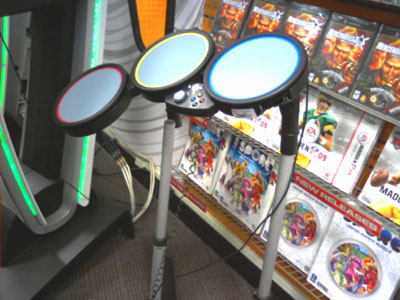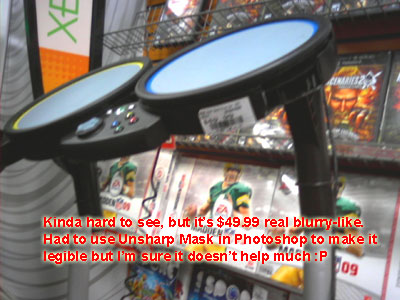Is "pixilated" correct?
By mrchup0n 1 Comments
For as long as I've been writing about videogames -- as a fan, as a co-founder of a hobbyist site, and as a freelancer, counting all the way back to the days when I wrote terrible reader reviews for RPGamer while Paws was running things on that part of the site -- I've tried to remember to type the word "pixelated" and leave it at that. It's not a real word in the dictionary. It gets the red-line stink-eye from Microsoft word. Hell, I don't even see it in the Videogame Style Guide. Nevertheless, I've used it to describe game visuals in which pixels -- the dot, the fundamental element of a digital image -- are especially prevalent, for better or for worse.
Of course, I couldn't "just leave it at that." All of the indicators that pointed to "pixelated's" non-existance (Word, dictionary, style guide) have -- at least as long as the style guide's been out -- made me go back and begrudgingly change the word to "grainy". Only this isn't entirely accurate, since it carries a negative connotation and doesn't entirely carry the same meaning of what I try to emphasize when I mean "pixelated" -- Mega Man 9 is pixelated but it ain't grainy. Nevertheless, I'd change the word more often than not.
Now, this post isn't a complaint or a plea or whatnot -- the situation is just a little curiosity of mine. Today, I saw two separate instances of the word "pixilated" in place of where I'd use "pixelated" instead. Running the spell-checker in Microsoft Word to give me some assistance with regards to "what is the correct spelling then, Mr. Gates?" would return "pixilated" too. But, I never used it because -- despite it being a real word -- it doesn't fit the definition:
Main Entry: pix·i·lat·ed Listen to the pronunciation of pixilated
Variant(s): also pix·il·lat·ed Listen to the pronunciation of pixillated \ˈpik-sə-ˌlā-təd\
Function: adjective
Etymology: irregular from pixie
Date: 1848
1: somewhat unbalanced mentally ; also : bemused
2: whimsical <pixilated pleasures>
Given the definition of the word, I don't believe that it fits the context of either of the articles I saw -- though in a certain light I might be able to justify its usage in Kotaku's Cave Story post (in which I'd imagine it would use the second dictionary definition -- "whimsical").
The funny thing is, if you plug "pixilated" into Google, the engine offers a correction (as it usually does before the first search result):
Did you mean: pixelated
Word. Sergey and Larry know whassup.
The Man Who Was Mega -- Nine Times
By mrchup0n 2 Comments
I'm captivated by Mega Man 9.
See, I was expecting good old-fashioned nostalgia wrapped up in an entirely unfair bow, with the name on the gift tag reading "Cheap Cheap Cheap", an experience that I would indulge in for about an hour or two before admitting defeat and refusing to ever play again.
Instead, so far I see extremely well-designed, very difficult but not unsurmountable levels which each come with tricks or gimmicks. There's the teleportation ring -- oh, and the robot that picks you up and forces you in a direction -- in Galaxy Man's level. There are the corkscrew platforms in Tornado Man's level, the bubbles and flying platforms in Splash Woman's level, and the elephants in Concrete Man's level. Each gimmick gives you a very simple, almost harmless taste of what's to come, and then comes back later in the level much tougher than before. It gives you the opportunity to learn and understand what it is you're supposed to do to pass the level, and if you just sit and watch any given situation for 30 seconds, you'll be able to understand exactly what to do.
Now, granted, I've only been to four of the eight stages thus far, but I'm fully liking what I see so far. I do miss the ability to slide, but other than that, the game is gravy. The boss behaviors are excellent -- they have patterns, but they mix them up a bit, so that you can't just exploit one thing over and over. Remember in Mega Man 2 how you could control when Metal Man attacked, because he would never fire until you did? Remember how you could defeat Heat Man without him ever shooting off fireballs, because every single time you shot him, he would just blaze towards you without doing anything else? So far I've not found any kind of exploitation in Mega Man 9. Yet, you can still see every attack coming with split-second's time, so you're given a (barely) fair shot at escaping whatever it is that's coming your way.
It also deviously plays on what you might expect as a Mega Man veteran. Little things like how Tornado Man's air whisps come up at you a split second after you'd expect them to, so all you really have to do is run from one side of the screen to the other and you wouldn't get hit, except you probably wouldn't do that at first because of previous Mega Man bosses whose attacks homed in on you. Or Splash Woman's bolts that come down at you, except they always come at you where you stand, not where you'll be, so all you have to do is wait and then step out of the way, except you normally wouldn't because -- again -- you're accustomed to those bolts anticipating where you'll be. It's a little confusing to explain -- but when you play it, you feel it.
Mega Man 9 is absolutely fantastic so far, and until I meet my 389675th untimely death at the hands of disappearing blocks, I expect it to continue being fantastic.Trigames.NET Podcast 108 and The Art of Selling Broke Merchandise
By mrchup0n 3 Comments
First thing's first: Trigames.NET Podcast episode 108 has been up for almost two days now, so if you don't know where to get it, download it from here. Those of you with Zune / iTunes should already have it in your RSS feed. If you want to read the blurb, you can get it here.
Remember, there's still the homework of sending us your most horrible stories while playing online against ignorami. What's the most ignorant or flagrant thing you've been called or heard someone been called, or whatever you've heard, when playing online? The saddest (as in dude, that's sad, not as in "cry tears" sad)?
Now, onto the show. I was in a Gamestop today coming back from lunch when I spotted, right next to the Rock Band 2 demo unit, a lonely drum kit not being used. The reason? Its green pad -- the right-most one -- had been broken clean off.
So why was Gamestop STILL showing it off there?
One look closer showed the answer: These twerps were trying to sell the unit as a $49.99 SKU. WHAT THE HELL!
Wow. Just... WOW. If there ever were a more appropriate situation for Kevin Pereira's "Really????????" than this, I'd like to see it.
Oh, and in case anyone's interested in seeing this debacle in person, this was the Gamestop I was at:
GameStop #1363
Broadway and 33rd Street
New York NY, 10001 US
The Nintendo DSi
By mrchup0n 4 Comments
A few key things that make me want to buy it:
- Built-in web browser and functionality for downloading games and other Nintendo software directly to its internal storage, a la iPods and Zunes that connect to their music stores directly
- Addition of the necessary SD slot to allow for photo / music storage -- can we maybe get some Virtual Console service on our DS???
- 3 megapixel camera -- but this is up in the air. Is it really 3 megapixels? And can I capture movies with it?
A few key things that make me sad about it:
- Gone is the GBA slot. Ok, so maybe the lot of you don't even use it. I sure as hell do. Carrying one DS lite versus carrying my DSi and my GBmicro... the former is obviously less of a space hog.
- If the camera ISN'T 3 megapixel. Chris Kohler and the Game|Life blog over at Wired wrote down 300,000 pixels but mistakenly associated that with 3 megapixels. Which one is it? 300,000 or 3,000,000?
- Price increase. It's going for the equivalent of $180 over in Japan when it comes out this November. No, it's not a surprise, and it's not unjustified, but can't you just picture the happiness leaving your wallet for that brief instant when you fork over the dough? This is Japanese pricing, though. No word yet on US details.
This isn't a point-for-point matchup in determining whether or not I'd buy the unit, of course. Yeah, there are 3 on each side, but that's just coincidence. I'd have to first find clearer information on the camera resolution. Then I'd need to know US pricing details. Finally, I'd need to know further information: is the battery life increased? How do the bigger screens look, since bigger isn't always better (larger pixels = blockier image)? Does audio playback functionality features like slow-down and stuff mean that I can also record audio, too, and can I record movies in addition to taking pictures, making interviewing people for Trigames that much easier? Will there be VC support for the DS?
I'm not going to just automatically buy this thing because they shove it in front of my face, but I do think they've made worthwhile enhancements. I kind of feel like I want a PSP3000, too, though...
In any case, it's time to sleep. Catch the information on any one of the many live blogs going on (I've been looking at blogs.wired.com/games).
GMAT Study Break: Pajiba ranks Uwe Boll as #5 Worst Director
By mrchup0n 2 Comments
Some of you may dismiss this after seeing Michael Bay on this top ten list. I, for one, love that placement. But I'm sure all of you will like this sucker: Uwe Boll is ranked #5 out of the top ten worst directors working in Hollywood today.
"Specializes in creating aimless, plot-less movies out of video games that have absolutely no business being made into movies..."
Back to studying. Oh yeah, episode 108's up. If you know where to look.HOMEWORK FOR YOU (Trigames.NET Podcast 107: Red Ring of PR)
By mrchup0n 1 Comments
Send Us Your Red Ring Stories!
By mrchup0n 2 Comments
In the wake of Dean Takahashi's investigative report, I thought it'd be fun to hear and read out your red ring stories (MsCortana, I'm looking at you and your second broken Xbox in a row ![]() ). Those of you who haven't worn yourselves out sending such stories to other podcasts should take a minute and send yours over to mailbag AT!!! trigames DOT!!! net or use this form right here.
). Those of you who haven't worn yourselves out sending such stories to other podcasts should take a minute and send yours over to mailbag AT!!! trigames DOT!!! net or use this form right here.
Also, send in questions or comments about both the Sore Thumbs blog that gives the publisher's perspective on the "publisher versus games media", er, "battle" as that guy calls it, and the blog I posted earlier this week dealing with what a DRM-free world might mean. You can also find the latest episode of the podcast here.
Podcast 106 is up!
By mrchup0n 2 Comments
After MUCH hassle and like 4 nights straight of editing. It's up.
PIRACY, ARR! Would you take DRM-Free's kindness for weakness?
By mrchup0n 2 Comments
Pop quiz, hotshot. Would you honor a publisher who, in exchange for your 49.99 wampum, handed you a completely DRM-free PC game on a silver platter?
Recently I tested out the Early Access beta of Good Old Games (or, GOG for short -- http://www.gog.com), a service that promises to deliver older PC games at a low cost, sporting compatibility with 32- and 64-bit versions of Windows XP and Windows Vista, and with no DRM restructions. What's "older"? Think Fallout, Jagged Alliance 2 and the Redneck Rampage collection (yes, that Redneck Rampage) as well as not-so-old offerings like Giants: Citizen Kabuto and even Colin McRae Rally 2005. GOG delivers completely on its no-DRM promise, letting me freely copy the installer file for Messiah (priced at $5.99) back and forth between my laptop and PC, without needing an internet connection to activate it.
With the whole recent drama over Spore and its "Draconian" DRM/activation system, it's nice to see an up-and-coming service that doesn't automatically assume you're some sort of gnarly pirate. You own the file and are free to do with it what you wish. The problem, of course, is that "what you wish" includes, well, sharing the file at your discretion. Without an activation key or a launcher a la Steam or Gametap to verify the authenticity of your ownership, seedy types could just throw the file up somewhere or pass around USB thumb drives with "free data" on it to their friends.
Now, some people claim to pirate software -- among other things, such as movies and music -- because they feel disrespected. They don't want to be presumed guilty until proven innocent by software, so they look online for pirated, cracked software... and ironically proving themselves guilty in the process. One of my friends says he will gladly pay for the movies he pirates if providers will let him obtain and handle those movies how he wants to: download from a service, watch on his PC, or burn to a DVD to watch in his own house, or port over to his portable media player, et cetera. One can surmise that there is a subset of PC gamers that feel the same way: "I will stop pirating games," they say, "when a provider lets me download and install a game without having to put up with SecuROM or being connected to the internet. I don't want to have to hunt for my disc, and I want to be able to enjoy Half Life 2 in the event of a service outage from my internet provider."
GOG's premise seems to be one that would satisfy this subset. Putting aside the somewhat lacking catalog for a minute (it's in Beta after all), the question remains: How big is that subset? How much larger is the subset of people who don't care and will just mooch off of yet another subset of people who are willing to pay the $5.99 for the privilege to distribute the software on their own? And as such, is this methodology a viable answer for current-day PC game publishers in their battle against software piracy?
Over the summer, European music store 7digital claimed that DRM-free music boosted sales by a significant amount, but AlleyInsider is rightfully skeptical of those percentages as no hard numbers were given. Furthermore, the relationship between these sales numbers and potential DRM-free PC game sales is tenuous at best: "triple-A" PC games are generally $50, with music being a fraction of the cost. Sure, there's the argument that games offer much more entertainment for your dollar, but people still go through sticker shock regardless.
There's still the question of game quality -- why pay $50 for a game that's not worth it to you -- though this might be made moot by the oft-repeated point that those who "tried" and disliked such a game wouldn't have bought it anyway.
Finally, the temptation to have $50 of game, for free, and without any hacks to install, might be too great for some. Say a law-abiding citizen purchases a game, and "lends" it to his very good, but very seedy (unbeknownst to Mr. Abidey) pal. McSeedy then just can't resist distributing it under his pirate alias for all to download.
Now, I don't know how pirate networks work -- and frankly, I never want to find out. I don't know if they're in it for the notoriety or if they just believe they're being digital Robin Hoods. In the case of the former, DRM-free games would provide such an effortless experience that perhaps it wouldn't be worth it to distribute, I guess.
The more I think about it, the more I'm resigned to say that it really just doesn't matter. I feel like those pirates who are so determined to get around copy protection -- and ultimately succeed nearly all the time (remember when hackers kept finding solution after solution to get around Sony's continued PSP firmware updates?) -- will just keep on doing what they're doing, providing files for everyone to download, because they can.
Perhaps it's just my inherent lack of faith in much of humanity that this virtual extending of the olive branch -- appeasing the angry DRM-embattled consumer -- will do little good. I'm sure that a more optimistic outlook would take into consideration the relative success that Steam is enjoying, even with its required internet connection and launcher. But isn't it a little hard to look past the looming possibility that, in the wake of a hypothetical DRM-free PC gaming world, too many potential customers will take the providers' kindness for weakness? There has got to be a better way to protect your product other than forcing customers to call hotlines every time they want to re-install their games, but is opening the floodgates an effective the solution?
Should any service decide to follow in GOG's footsteps, if it's even successful in the first place, I'll be first in line to support it. I'm willing to pay the money for the products I know I want, and I'm even more appreciative when publishers don't treat me like a crook. I just hope and pray that others follow suit.



Log in to comment